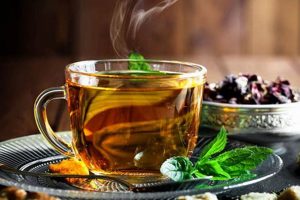
The question of whether consuming infusions derived from herbs can contribute to a reduction in body mass is a topic of considerable interest. Certain varieties of these beverages are purported to possess... Read more »

Hydration is essential for human health, primarily achieved through water consumption. Herbal teas, infusions derived from plants other than Camellia sinensis (true tea), are often considered as a beverage choice. However, the... Read more »

Infusions derived from herbs, spices, flowers, or other plant material offer potential advantages to well-being. Unlike traditional teas, these beverages are typically caffeine-free and provide a diverse array of phytochemicals and antioxidants.... Read more »

The practice of consuming infused beverages derived from plants for the purpose of body weight reduction involves a multi-faceted approach. This method utilizes the purported properties of various herbs to influence metabolic... Read more »

The consumption of plant-based infusions as a beverage choice while expecting necessitates careful consideration. These beverages, prepared by steeping various plant parts in hot water, are often perceived as natural alternatives to... Read more »

Herbal infusions, prepared by steeping dried herbs, flowers, or spices in hot liquid, are frequently consumed as a beverage. The question of whether these beverages contribute to daily hydration needs is often... Read more »

The practice involves consuming infusions made from herbs, spices, or other plant materials during periods of abstinence from food or specific beverages. This consumption differs from drinking traditional tea (derived from Camellia... Read more »

The consumption of infusions derived from herbs, spices, and other plant materials offers a diverse range of potential health advantages. These beverages, distinct from traditional teas made from Camellia sinensis, provide a... Read more »

The consumption of infusions made from herbs, spices, flowers, or other plant materials, excluding Camellia sinensis (true tea), is a widespread practice. These beverages offer a variety of flavors and aromas, often... Read more »

The consistent consumption of infusions derived from herbs on a daily basis represents a dietary practice with potential implications for overall well-being. This involves preparing and ingesting a beverage steeped from various... Read more »


